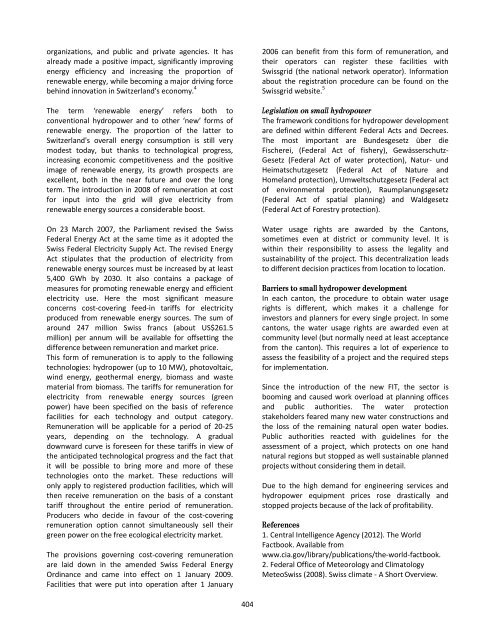WSHPDR_2013_Final_Report-updated_version
WSHPDR_2013_Final_Report-updated_version
WSHPDR_2013_Final_Report-updated_version
You also want an ePaper? Increase the reach of your titles
YUMPU automatically turns print PDFs into web optimized ePapers that Google loves.
organizations, and public and private agencies. It has<br />
already made a positive impact, significantly improving<br />
energy efficiency and increasing the proportion of<br />
renewable energy, while becoming a major driving force<br />
behind innovation in Switzerland's economy. 4<br />
The term ‘renewable energy’ refers both to<br />
conventional hydropower and to other ‘new’ forms of<br />
renewable energy. The proportion of the latter to<br />
Switzerland's overall energy consumption is still very<br />
modest today, but thanks to technological progress,<br />
increasing economic competitiveness and the positive<br />
image of renewable energy, its growth prospects are<br />
excellent, both in the near future and over the long<br />
term. The introduction in 2008 of remuneration at cost<br />
for input into the grid will give electricity from<br />
renewable energy sources a considerable boost.<br />
On 23 March 2007, the Parliament revised the Swiss<br />
Federal Energy Act at the same time as it adopted the<br />
Swiss Federal Electricity Supply Act. The revised Energy<br />
Act stipulates that the production of electricity from<br />
renewable energy sources must be increased by at least<br />
5,400 GWh by 2030. It also contains a package of<br />
measures for promoting renewable energy and efficient<br />
electricity use. Here the most significant measure<br />
concerns cost-covering feed-in tariffs for electricity<br />
produced from renewable energy sources. The sum of<br />
around 247 million Swiss francs (about US$261.5<br />
million) per annum will be available for offsetting the<br />
difference between remuneration and market price.<br />
This form of remuneration is to apply to the following<br />
technologies: hydropower (up to 10 MW), photovoltaic,<br />
wind energy, geothermal energy, biomass and waste<br />
material from biomass. The tariffs for remuneration for<br />
electricity from renewable energy sources (green<br />
power) have been specified on the basis of reference<br />
facilities for each technology and output category.<br />
Remuneration will be applicable for a period of 20-25<br />
years, depending on the technology. A gradual<br />
downward curve is foreseen for these tariffs in view of<br />
the anticipated technological progress and the fact that<br />
it will be possible to bring more and more of these<br />
technologies onto the market. These reductions will<br />
only apply to registered production facilities, which will<br />
then receive remuneration on the basis of a constant<br />
tariff throughout the entire period of remuneration.<br />
Producers who decide in favour of the cost-covering<br />
remuneration option cannot simultaneously sell their<br />
green power on the free ecological electricity market.<br />
The provisions governing cost-covering remuneration<br />
are laid down in the amended Swiss Federal Energy<br />
Ordinance and came into effect on 1 January 2009.<br />
Facilities that were put into operation after 1 January<br />
2006 can benefit from this form of remuneration, and<br />
their operators can register these facilities with<br />
Swissgrid (the national network operator). Information<br />
about the registration procedure can be found on the<br />
Swissgrid website. 5<br />
Legislation on small hydropower<br />
The framework conditions for hydropower development<br />
are defined within different Federal Acts and Decrees.<br />
The most important are Bundesgesetz über die<br />
Fischerei, (Federal Act of fishery), Gewässerschutz-<br />
Gesetz (Federal Act of water protection), Natur- und<br />
Heimatschutzgesetz (Federal Act of Nature and<br />
Homeland protection), Umweltschutzgesetz (Federal act<br />
of environmental protection), Raumplanungsgesetz<br />
(Federal Act of spatial planning) and Waldgesetz<br />
(Federal Act of Forestry protection).<br />
Water usage rights are awarded by the Cantons,<br />
sometimes even at district or community level. It is<br />
within their responsibility to assess the legality and<br />
sustainability of the project. This decentralization leads<br />
to different decision practices from location to location.<br />
Barriers to small hydropower development<br />
In each canton, the procedure to obtain water usage<br />
rights is different, which makes it a challenge for<br />
investors and planners for every single project. In some<br />
cantons, the water usage rights are awarded even at<br />
community level (but normally need at least acceptance<br />
from the canton). This requires a lot of experience to<br />
assess the feasibility of a project and the required steps<br />
for implementation.<br />
Since the introduction of the new FIT, the sector is<br />
booming and caused work overload at planning offices<br />
and public authorities. The water protection<br />
stakeholders feared many new water constructions and<br />
the loss of the remaining natural open water bodies.<br />
Public authorities reacted with guidelines for the<br />
assessment of a project, which protects on one hand<br />
natural regions but stopped as well sustainable planned<br />
projects without considering them in detail.<br />
Due to the high demand for engineering services and<br />
hydropower equipment prices rose drastically and<br />
stopped projects because of the lack of profitability.<br />
References<br />
1. Central Intelligence Agency (2012). The World<br />
Factbook. Available from<br />
www.cia.gov/library/publications/the-world-factbook.<br />
2. Federal Office of Meteorology and Climatology<br />
MeteoSwiss (2008). Swiss climate - A Short Overview.<br />
404


